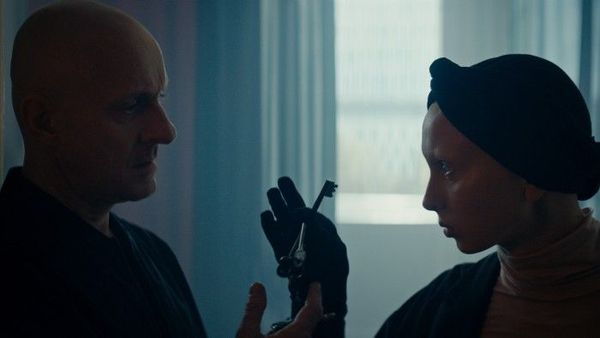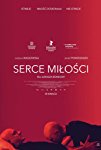Eye For Film >> Movies >> A Heart Of Love (2017) Film Review
A Heart Of Love
Reviewed by: Andrew Robertson

Wojciech Bajkowski and Zuzanna Bartoszek are real people. Jacek Poniedzialek and Justyna Wasilewska are real people too. The first two are artists. The second pair are actors. The latter portray the former. Lukas Ronduda directs. Robert Bolesto writes. Statements of fact cannot quite describe the film because it is something beyond text. This is part of its intent. This is part of its success.
Wojciech is a musician, among other things. Zuzanna is a poet, among other things. They are a couple, among other things. They live in Warsaw, but a very particular Warsaw, one inflected by art and artfulness into a kind of ur-city, one that bleeds from Metropolis into Blade Runner and back again, awaiting a 2049 that is possessed of a quotidian futurity, that seems less halfway through the new century than a seventieth year of the 1980s. The datelessness of post-Soviet spaces, the constructedness of art.
There are videogames, bathtubs, concerts, telephone calls - synecdoche abounds. Zuzanna's auto-immune conditions are a mirror for senses of self that are effectively attack, the self-reflexivity extends to the film sharing its title with a work depicted within its title, but Wojciech and Zuzanna are also mirrors. More than, in each other's orbit, spiralling around some creative barycentre, a place of weightlessness between two elements locked in mutual attraction. A Heart Of Love hides in that balance in that void.
The artificialities are layered to an extent that means that there is a simulation of the flat the couple share where simulations of the couple argue, but the couple watching that couple are themselves a simulation, but the argument may be real, the intent might be real. Surface abounds, speech, texture, but wigs and gloss and separation provide other opportunities. Telephony begets voyeurism, perhaps, but we too are watching, in the audience. Pocket-dialling exhibitionism is part and parcel of the combinations at play here. Contrast abounds.
The art department excel themselves - everything appears real. Lukasz Gutt's lens (and Robert Jaworksi's stills) bring an air of hypercolour hyper-reality, but it's in the sound - a large department, music by Wojciech, but the sound - challenges like nightclubs and excessive displays of consumer electronics and poesy and angry declamations and videogames and corridor confrontations and slamming of doors are all met. That everything feels real contributes to the excessive sense that nothing is as it is, that poise, even when there is not, that pose - arch to the point that it's Gothic, in the black and white and in the red credits and multiple-contributor dialogue, that sense of what is and what is not and onwards.
Corridor lights as flash triggers. Lighting that always manages to function to high-light (pun perhaps intended) what is going on, whatever is going on. Warm when it is not cool, cool when that's what's happening. Technically excellent.
Compelling like art should be. The brevity of its presence, a sensibility definite and captivating like the planets. Gravity, even in levity, a sense that if you have touchstones like The Fall (Mark E Smith, RIP) or The Fall (Tarsem Singh and his DoP) then this may be for you. A Heart Of Love I had for this. Yet I reference voids and balances of gravity because there is, perhaps, a hollow-ness here, an arch so poised that it defines a space - structural, even cold. That I liked it is perhaps because of this, but those not girded for irony might find it hard to bridge that gap.
Reviewed on: 07 Feb 2018















